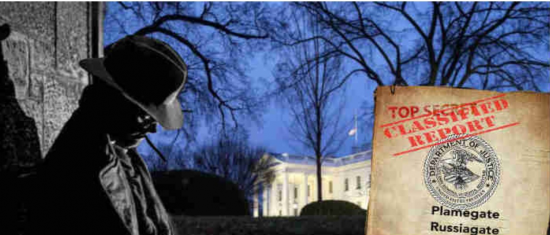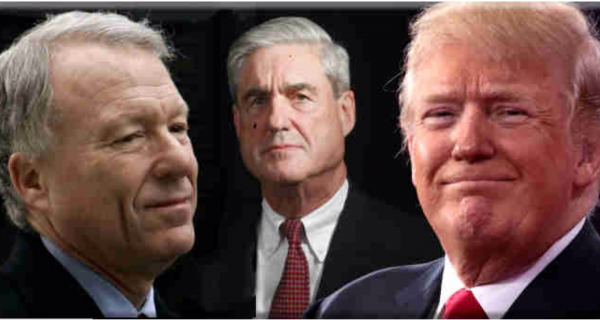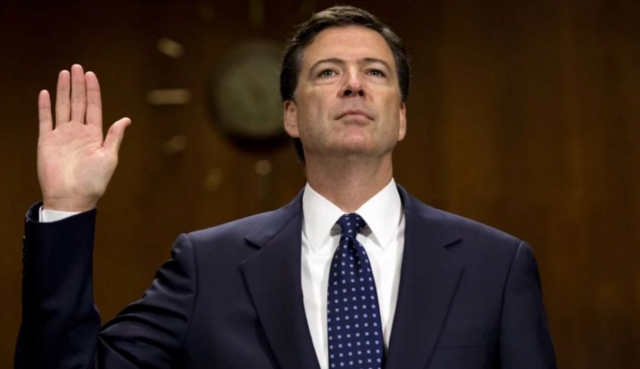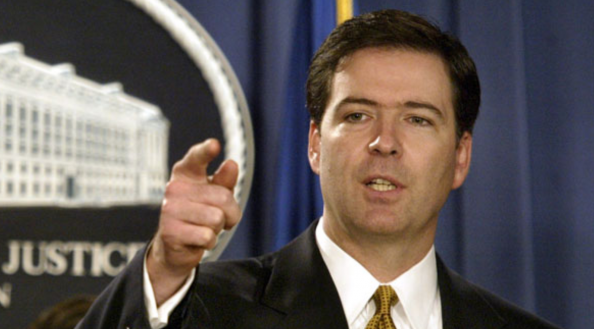Canada Free Press: ‘Deep State Playbook: Comparing Plamegate and Russiagate’
Ernie Souchak, Editor-in-Chief
The Report On Mueller
By Lee Cary & Marty Watters
The only “Mueller Report” that matters was not written by Robert Mueller III. It’s written about him, and his co-conspirators.
Long before the Russiagate hoax began, the authors examined the Special Counsel methods of then FBI director Robert Mueller, former Deputy Attorney General James Comey, and once U.S. Attorney Patrick Fitzgerald, before and during Plamegate.
We found that all three acted with an intent to serve and protect the Deep State.
Their modus operandi (M.O.) reflects Mueller’s Fake Investigation Playbook.
The M.O. of the Playbook was evident during the George W. Bush administration in Plamegate. Then, before and during the first term of the Trump administration, it was replicated.
Below is a step-by-step comparison of the Playbook’s 10 steps during two Special Counsel episodes.
Crooked FBI Director Robert Mueller suppressed truth in Plamegate!
Ernie Souchak, Editor-in-Chief
The following is from the Canada Free Press article titled:
Libby’s pardon means Trump knows Mueller’s witch hunt M.O.
By Lee Cary & Marty Watters —— April 15, 2018
-----------------------------------
The M.O. in Plamegate saw the Department of Justice (then Deputy Attorney General James Comey) and the Director of the Federal Bureau of Investigation (then Robert Mueller III) collude to appoint a Special Counselor (Patrick Fitzgerald) to discover who leaked Valerie Plame’s C.I.A. employment to a prominent Washington, D.C. reporter, the late Robert Novak.
But finding the leaker was not what this “investigation” was about—not at all. That assertion is provable.
Canada Free Press readers of an earlier post know the sequence of events that led to the fake investigation into Plamegate. Quoting mostly from that earlier article, here is the chronology:
Early October 1, 2003: An “agitated” Under Secretary of State Richard Armitage calls his boss, Secretary of State Colin Powell, to say he just realized he had inadvertently leaked Valerie Plame’s C.I.A. employment to Novak. By then, the Department of Justice was looking into the leak. That morning the big wheels at the State Department spun-up, quickly.
Later October 1, 2003: “Within hours, William Howard Taft IV, the State Department’s legal adviser, notified a senior Justice official that Armitage had information relevant to the case,” wrote [Michael] Isikoff.
October 2, 2003: According to Isikoff, a “team of FBI agents and Justice prosecutors investigating the leak questioned the deputy secretary.” In May 2015, an investigative reporter for a Chicago-based website interviewed Taft concerning that October 2, 2003, meeting Taft attended at F.B.I. Headquarters along with Richard Armitage and Colin Powell. According to Taft, in that meeting “Rich” Armitage confessed to the F.B.I. that he was Novak’s source for the Valerie Plame story. Taft also said that the F.B.I. asked him, Armitage, and Powell to not disclose the information—that Armitage was the leaker—to anyone. Taft said he, Armitage, and Powell all agreed to that request, even though they were under no obligation to comply.
It is reasonable to assume that the Secretary of State and Deputy Secretary of State could not meet with F.B.I. officials, at the F.B.I. Headquarters Building, without the F.B.I. Director’s knowledge of, or attendance at, the meeting. Mueller was the F.B.I. Director.
A description of this meeting was told telephonically, by William Howard Taft IV, to an IllinoisPaytoPlay website investigative reporter, Marty Watters, co-author of this article.
Taft was there. Mueller was likely there. And if he wasn’t there, he surely knew about the meeting, before and after. And that means that Mueller knew who leaker was before the investigation began to identify the leaker.
---------------------------------------
Read full article here.
Related: Judith Miller blows the whistle on “Special Counsel” Patrick Fitzgerald
Former CIA attorney John Rizzo confirms Plamegate was a disinformation campaign
Ernie Souchak, Editor-in-Chief

Former acting general counsel for the CIA, John Rizzo, was recently provided articles from IP2P that state clearly and unequivocally that Plamegate was a CIA disinformation campaign, and he was asked to comment on them.
After reading these reports, Rizzo conveyed his compliments, adding that "Mr. Souchak is obviously a good, dogged reporter".
So not only did Rizzo not dispute my reports that Plamegate was a CIA disinformation campaign, he actually praised me for them.
Thank you, John.
Now we're getting somewhere. Valerie Plame, it's your turn to tell the truth.
Please start by explaining your relationship with Marc Grossman, the man who really exposed your cover, Brewster Jennings & Associates, as a CIA front.
And while you're at it, Valerie, why don't you tell everyone exactly what your husband, Joe Wilson, was doing for the American Turkish Council.
And I am sure that your adoring fans would also love to hear why you're actively campaigning to elect Hillary Clinton president after she appointed Marc Grossman special representative for Afghanistan and Pakistan in 2011.

Remember it was Grossman that got caught on a FBI wiretap peddling nuclear secrets on the black market that ultimately wound up in Pakistan.
Or was that sanctioned by the CIA as well?
What say you, Valerie? You were supposed to be watching out for that kind of activity, weren't you?
In any case the good news is that we can now once and for all dispense with the ridiculous notion that Dick Armitage was the person who exposed Valerie Plame as CIA.
The Armitage cover story was so easily disputed that it was downright embarrassing for us as a nation to have swallowed such a feeble lie.
And best of all, now that John Rizzo has confirmed for us that Plamegate was a CIA disinformation campaign, will someone please lower the curtain on the nauseating "Valerie Plame Show"?

Valerie Plame Wilson’s friend, Marc Grossman, guilty of Treason!
Ernie Souchak, Editor-in-Chief
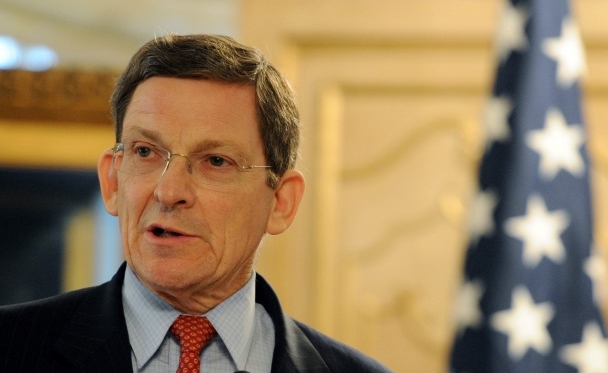
We know, from sworn testimony given by FBI whistleblower Sibel Edmonds, that former Undersecretary of State Marc Grossman committed treason when he divulged classified information to Turkish operatives in the summer months of 2001, included in that information was the fact that Brewster Jennings & Associates and Valerie Plame were CIA.

We also know, from testimony given by Marc Grossman in the U.S. v. Libby trial, that he and the Wilsons are friends.
Here’s what we don't know:
(1) Will Joe Wilson pronounce Marc Grossman a traitor to his country for outing his wife as a CIA operative?
When Joe Wilson accuses Dick Cheney of being the person behind the outing of his wife, he calls Cheney a traitor to his country.
(2) Do Valerie and Joe expect an apology from Marc Grossman? They once wanted one from Cheney.
(3) When the Wilsons claim they want to “Hold Government to Account,” does that mean they support Sibel Edmonds efforts to do the same?
These are simple questions; however, the Wilsons refuse to answer them.
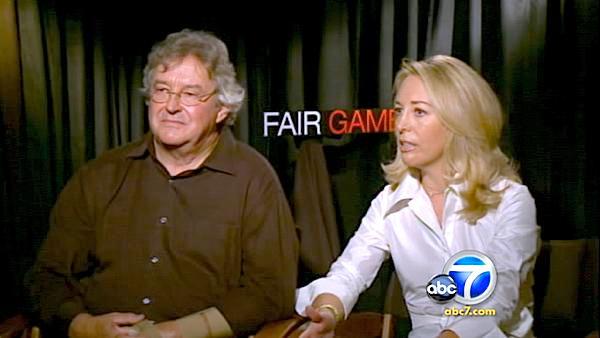
Here are a few questions you can answer for yourself:
(A) Would a real covert CIA agent not know that their cover was blown in 2001, and believe it was blown in 2003 as purported?
(B) Would the Department of Justice not tell the CIA that Plame's and Brewster Jennings & Associates’ covers were blown?
(C) Should it concern us that Marc Grossman's former boss at the State Department, Richard Armitage, claimed he originally outed Valerie Plame two years after Grossman actually did, and now Armitage is Chairman of the Board at the American-Turkish Council (ATC)

Turkish President Abdullah Gul meets with Richard Armitage, Chairman of the American Turkish Council in Ankara, Turkey
Keep these things in mind about the ATC:
• Our federal government doesn’t want FBI whistleblower Sibel Edmonds talking about the ATC.
• Grossman told ATC that Brewster Jennings was a CIA front.
• The ATC helps facilitate billions in defense contracts between the Turkish government and FBI Director James Comey's friends at Lockheed Martin, where Comey used to be VP and Senior Counsel. Lockheed Martin's Board of Directors also includes Joseph Ralston and James Loy who work with Grossman at the Cohen Group. (that would be Cohen as in Bill Clinton's former SecDef)
• And, the ATC hosted the function where Valerie and Joe Wilson claim to have first fallen in love.
So is that just a series of coincidences?
Crimes against the United States are also committed by those who help cover-up an act of treason.
It’s long past time for Sibel Edmonds to be heard, and for traitors to be held accountable by the Law.
Learn more at Edmonds website: http://www.boilingfrogspost.com/
The Valerie Plame case: The man who was appointed to appoint Patrick Fitzgerald “Special Counsel”
Thomas Barton, Investigative Reporter
U.S. Attorney James B. Comey was appointed Deputy Attorney General for the purpose of appointing U.S. Attorney Patrick Fitzgerald as "Special Counsel" to lead the investigation into who "leaked" Valerie Plame's identity as a C.I.A. employee to the press. It was all choreographed.
It was known that Deputy Secretary of State Richard Armitage leaked Plame's identity as a CIA employee to the press - even before Patrick Fitzgerald was appointed "Special Counsel". Go figure.
And, it was known that Armitage was the "Leaker" before Comey was chosen for his job, and before he appointed Patrick Fitzgerald as "Special Counsel," and before Fitzgerald was tasked to find out what the government already knew.
Seriously, you can't make this stuff up! Here's a sequence of key dates:
Oct 1, 2003: Bob Novak published an article that causes Richard Armitage to go immediately to the FBI and confess to being the "Leaker" in the Valerie Plame case.
Oct. 3, 2003: George W. Bush nominates Patrick Fitzgerald's peer and close friend, U.S Attorney James B. Comey, to be Deputy Attorney General.
Oct. 29, 2003: During Comey's senate confirmation hearing, Senator Chuck Schumer (D-NY) questions Comey about the possibility of Attorney General John Ashcroft recusing himself in the Plame case and Comey appointing a Special Counsel to that case.
So, what happened next?
Comey was confirmed Deputy Attorney General.
Ashcroft recused himself, putting Comey in charge of the Plame case.
Comey appointed his close friend, Patrick Fitzgerald as Special Counsel in charge of finding the "Leaker".
And, this was all done after Armitage confessed to being the "Leaker," said he wouldn't seek legal representation, and claimed to be prepared to accept the consequences of his actions.
Fitzgerald asked Armitage to keep his guilt to himself.
Armitage complied.
Judith Miller went to jail, and Scooter Libby was prosecuted and found guilty...of something other than leaking.
Shortly after appointing Fitzgerald to the Plame case, Comey left the Attorney General's office to become lead counsel at Lockheed Martin. We'll explain the significance of that move later.
And where's Comey today? He's a partner and general counsel at Bridgewater Associates.
Stay tuned.....
The truth about the Valerie Plame case. (10 years later)
Hugo Floriani, Investigative Reporter
We're going into the final year of a decade since the Valerie Plame case burst into the national news, and still the truth remains untold by key persons involved. Why is that?

Is Richard Armitage telling the truth when he says he didn't tell President Bush that he was the leaker in the Valerie Plame case because of U.S Attorney Patrick Fitzgerald?
In an interview with CBS News national security correspondent David Martin, former Deputy Secretary of State Richard Armitage said he didn't come forward as the source of the leak because "the special counsel, once he was appointed, asked me not to discuss this and I honored his request".
Patrick Fitzgerald was appointed special counsel on December 30, 2003.
Let's examine Armitage's claims.
Armitage has stated that reporter Bob Novak's column, published October 1,2003, caused him to (1) immediately meet with the FBI and confess to being the leaker, and (2) then call Secretary of State Colin Powell and tell him he was Novak's source and, therefore, responsible for leaking the identity of Valerie Plame as a CIA employee.
According to court records Richard Armitage went to Marc Grossman, the Undersecretary of State, on the evening of October 16, 2003 and told Grossman that he, Armitage, was the leaker. Armitage did this knowing that Grossman was scheduled to be questioned by the FBI the next day.
Undersecretary Marc Grossman is the author of the memo that started it all by identifying who Valerie Plame was to his superiors at the State Department - Armitage and Powell.
So, what do we know?
(1) We know that as of Oct. 16, 2003 the top three officials at the State Department and the FBI knew that Richard Armitage was the person who divulged Valerie Plame's identity to the press.
(2) We know that, between Oct. 16 - Dec. 30, it was not Patrick Fitzgerald who was keeping the three top officials in the U.S. State Department from divulging that Armitage was the leaker.
And (3) we know, that, if in the time between Oct. 16 - Dec 30, any one of the State Departments top three officials (Powell, Armitage or Grossman) or the FBI would have gone public with what they knew, Patrick Fitzgerald would have never been appointed Special Counsel.
Consequently, New York Times reporter Judith Miller would not have spent nearly three months in jail, and Vice President Dick Cheney's Chief of Staff, Scooter Libby, would not have been prosecuted.
As this unfolds, ponder this:
Did our current FBI director Robert Mueller keep the identity of the "leaker" Richard Armitage from his boss, Attorney General John Ashcroft?
And, if not, did John Ashcroft neglect to tell President George W. Bush?
To be continued....
Patrick Fitzgerald and the Kabuki Dance of the Valerie Plame Thing
Hugo Floriani, Investigative Reporter

Why would James B. Comey appoint Patrick Fitzgerald as Special Counsel on a case that was already solved?
Why would he even appoint a Special Counsel at all when Richard Armitage, the man responsible for exposing the identity of CIA employee Valerie Plame to the media, had already confessed and had not even hired an attorney to represent him?
Who is James B. Comey?
_______________________________________________________________________________________
James B. Comey, Jr. (born December 14, 1960) was U.S.Deputy Attorney General in the George W. Bush's administration. As Deputy A.G., Comey was the second-highest ranking official in the Department of Justice (DOJ). He ran the day-to-day operations of the DoJ, serving in that office from December 2003-August 2005.
Comey had been U.S. Attorney for the Southern District of New York before becoming Deputy A.G.
In December 2003, he appointed his close friend and former colleague, U.S. Attorney Patrick Fitzgerald, to be the Special Counsel leading the investigation into the Valerie Plame leak after Attorney General John Ashcroft recused himself.
In August 2005, Comey left the DOJ and became General Counsel and Senior Vice President at Lockheed Martin. From there he went on to Bridgewater Associates in June 2010.
________________________________________________________________________________________
In 2009, Comey’s total compensation package at Lockheed Martin was 6,113,797. Apparently, no one in the media cared that Lockheed worked closely with the Cohen Group where Marc Grossman was Vice Chairman.
Grossman was a key figure in Patrick Fitzgerald's quest to find out who leaked that Valarie Plame worked for the CIA.
Before Fitzgerald’s investigation team even bought their office supplies, Comey and Fitz knew that Armitage had, innocently he claimed, leaked the knowledge about Valarie Plame to, now deceased, columnist Bob Novak.
Comey left Lockheed to work at Bridgewater Associates and then, after a short stay at Bridgewater, he became a partner with Attorney General Eric Holder's former law firm, Covington & Burling.
What do Lockheed Martin and the Cohen Group have in common? Did they have any vested interests in Iraq or Afghanistan while Fitzgerald was chasing down the phantom leaker? Did the old media ever explore that possibility?
Has any reporter ever asked Fitzgerald or Comey why a phantom leaker was sought after the real leaker had already confessed? Did any Tribune or Sun Times reporter ever pose that question to Fitz?
Has anyone asked former New York Times writer Judith Miller how she feels about having spent nearly three months in jail after Fitz already knew that Armitage was the leaker? Does that make her a victim of wrongful imprisonment?

What does Scooter Libby say about all this?
And, lastly, did Fitzgerald or Comey violate any laws during this Kabuki dance?
Many questions – no media interest – hence, no answers. Nothing to see here folks, move along. It’s the Chicago Way.
Next..... Where did Dick Armitage eventually land?
“Golden,” the whitewashing of a Department of Justice crime spree
Ernie Souchak, Editor-in-Chief, Illinois PayToPlay & Hugo Floriani, Investigative Reporter
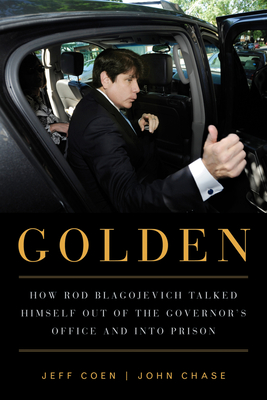
Chicago Tribune reporters Jeff Coen and John Chase wrote a 486-pages book that packs tedious and mundane details about former Illinois Governor Rod Blagojevich’s life, from birth to prison, around one key chapter that documents the role of former U.S. Attorney Patrick Fitzgerald in leaking information about his investigation of the ex-governor known nationwide as “Blago”.
The whitewash begins on the second page of the foreword entitled “Authors’ Note”: “We quote heavily from the recordings that federal agents made on phones used by the governor and others. All of those quotes come from transcripts of those phone conversations or the recordings themselves. We are grateful to those who provided case material that was outside of the public record.” (For ease of reading, we will italicize all quotations from the book.)
Those persons “who provided case material that was outside of the public record” remain unidentified throughout the book. But it soon becomes clear where they worked.
In an article written by Ernie Souchak posted on this website last September 14, we noted how the judge’s protective order, covering the transcripts of Blago’s phone conversations, stipulated that nothing prohibited Blago and his lawyers from telling his version of those recorded conversations. Blago and his attorneys were, though, ordered not to disseminate the transcripts that the feds gave them. Only the feds had permission to do that.
So, apparently, Coen/Chase secured those transcripts and recordings mentioned in the “Authors’ Note” from the feds. Here’s a question: Why was the information given to them?
Hold that thought.
The problem for the book’s core narrative – the arrest, trial and conviction of Blago – unfolds in Chapter 14 (pp. 257-295) entitled “I’ve got this thing…”
Background
On October 16, 2011, we concluded a ten-article series concerning U.S. Attorney Patrick Fitzgerald, which first posted here in on September 19, 2011, with this summary:
“So, what are the facts and circumstances that we know that collectively tend to prove, or sustain by their consistency…the hypothesis that Patrick Fitzgerald is a politically-driven, not jurisprudence-driven, prosecutor whose image as an intrepid, unbiased crime fighter is a media-created fabrication?
Here are a few headlines from Parts 1-9:
Fitzgerald acknowledged that someone leaked information to the Chicago Tribune, via a reporter for the Chicago Tribune, while the reporter, John Chase, sat mute in the front row of the news conference where the arrest of Blago was described as an effort to stop a crime spree. (Chase has told a source known to this writer that he would not identify who leaked him the information on First Amendment grounds.)
In fact, (1) Blago’s crime spree had, with Fitzgerald’s knowledge, been going on for several years. (2) Chase has not been called to account for tipping off Blago that his conversations were being recorded by the feds. (3) Eric Holder’s Department of Selective Justice has taken no steps – like that taken by Fitzgerald when he jailed Judith Miller of the New York Times in the Valerie Plame Case – to force Chase to reveal the source of the leak. And, (4) Fitz’s demeanor in discussing the leak in a press conference can be accurately described as disinterested.
The urgency to arrest Blago was manufactured out of whole cloth. The leak had to originate out of the DoJ. And, the closest outlet for the DoJ to the Chicago Tribune is Fitzgerald’s office. You connect the dots.
In retrospect, we know now that Richard Armitage was the confessed leaker in the Valerie Plame Case. We also know that Fitzgerald knew of Armitage’s confession before undertaking a long and costly investigation that convicted a key staff member of Vice President Cheney of a crime not connected to the Plame leak. And, that this media event, upon which the foundation of the Untouchable myth was built by the main stream media, was politically-driven.
The Plame “investigation” boiled down to a surrogate WWF-like wrestling match between two Big Beltway Boys: Armitage representing Powell – Libby for Cheney. With Fitzgerald as the biased referee. And, it will be so chronicled by unbiased historians in the future.
The arrest of Blago was timed, not to stop a crime spree, or the selling of a Senate seat – since the latter notion is built on the myth that, once Blago got paid for appointing someone, the act was immediate and irrevocable. The arrest was timed to save Congressmen Jesse Jackson, Jr., from criminal prosecution for bribing a governor in order to receive a Senate appointment. Connect the dots. It was about saving J.J., Junior.”
Chapter 14 – The Whitewash
The narrative here is significant, not just for what it reveals, but more for what it conceals.
The authors do not reveal the source for the information that Chase telephonically conveyed to Blago’s Spokesman, Lucio Guerrero, at approximately 10:30 p.m., Friday, December 4, 2008, namely, that the feds were listening in on Blago’s phone conversations.
Consequently, this question remains unanswered: Who leaked the information that Blago’s phone conversations were being wiretapped by the feds to the Tribune and Chase? Plus, why was that revelation leaked to the paper?
Then, why did Fitzgerald show no interest in tracking down the leaker?
We’re no closer today to answers to those questions after the 486 pages of whitewash.
Now, for the information in Chapter 14 that substantiates our October 2011 summary above:
Page 264: “Again, prosecutors noted the gravity of what Blagojevich had said. They were aware of the Balanoff meeting but had not recorded it.” (Tom Balanoff is president of the Service Employees International Union, Illinois Council, and the Vice President of its International Executive Board.)
How did the Coen/Chase know this information unless someone in the U.S. Attorney’s office gave them a blow-by-blow description of the investigation? Of course that’s what happened. The authors were scripted by the feds.
Page 267: “At the FBI’s listening room, there continued to be a mixture of thrilled disbelief and newfound resolve at what was being caught on the recordings. Agents believed they were capturing the sitting governor in incriminating conversations, and they played the calls for supervisors.
At one point, the FBI’s national director, Robert Mueller, was in town for a Chicago event. Having heard about the success of the Blagojevich operation, Mueller wanted to hear some of the recordings for himself. He stopped at the FBI’s Chicago headquarters on Roosevelt Road on the West Side near Ogden Avenue and took a seat in Rob Grant’s office. Agents had put together a disc of some of their favorite snippets for Mueller to hear.
Who was the guy dropping the F-Bombs? Mueller asked.
Well, that was the governor of Illinois, agents explained.
“You’ve got to be kidding me,” Mueller said, shaking his head, clearly pleased with how investigators were doing.”
This sounds like the testimony of an eyewitness to the event, given all the illustrative details. That eyewitness would be an employee of the FBI, or, someone from Fitzgerald’s office involved in the USAO’s investigation of Blago. This information clearly didn’t come from an audio tape or transcript of one of Blago’s intercepted calls, or from the building’s janitor.
It comes from a source intimately involved in the investigation.
Page 281: This portion of Chapter 14 explains the nature of the alleged urgency that caused the USAO to arrest Blago to, as Fitzgerald later claimed, stop an on-going crime spree.
“Fitzgerald had grown concerned that they had a sitting governor who had yet to make an appointment after working for weeks to see what he could get for himself in a deal for the Senate seat. They could let things go a little further, but it was starting to get risky that Blagojevichwould actually make a choice. Schar [Reid Schar, an Assistant U.S. Attorney, NDIL] said it would be derelict of those in the room to allow Blagojevich to make a decision. Everyone in the meeting believed the process had been corrupted, no matter how Blagojevich finally acted. To do something before he made a pick and out the investigation would at least make that corruption known, and the political could react to any pick by the governor.
In the end, there was agreement. Very soon, they would act, and likely on the morning of December 9, a Tuesday, the day before Blagojevich’s birthday and after a possible meeting the governor had been talking about with Jesse Jackson, Jr.”
What does “at least make that corruption known” mean? The USAO had been investigating Blago for years, and had compiled a substantial amount of evidence of corruption. At least, the goal should have been to arrest Blago when he accepted a bribe, and, also, arrest whoever paidthe bribe.
The real “risk” in letting Blago close a deal with the briber(s) negotiating with him on behalf of Jesse Jackson, Jr., was that they, too, would be implicated in a crime along with Blago. Whatever happened to the notion of intent to commit a crime? Blago went to jail – the briber(s) skated. That was the goal.
Pages 286-288: “’Jackson was the ‘uber African American,’ Blagojevich reminded Harris. He would consider what it would mean in black politics and how it would strengthen him, Blagojevich said, and don’t forget, third parties had offered him $1.5 million in fund-raising help.” (p. 286)
“’There’s tangible, concrete, tangible stuff from [Jackson’s] supporters,’ Blagojevich said, as Yang [Fred Yang, a pollster hired by Blagojevich] pressed him for more detail. ‘Well like, you know. You know what I’m talking about,’ the governor finally told him. ‘Specific amounts and everything.’” (p. 287)
“When prosecutors heard Blagojevich make the ‘tangible’ remark, they believed the Jackson proposal was in fact the way the governor was going to go.” (p. 288)
So, according to Coen/Chase, the feds believed that Blago was about to do a deal that would yield him $1.5 million for appointing Jesse Jackson, Jr. as a U.S. Senator from Illinois. That means that Blago was arrested to stop the commission of a specific crime, rather than to stop a crime spree.
If the USAO would have waited, both the bribee and the briber would have been caught and prosecuted. But the trap was sprung prematurely – for a reason.
Robert Blagojevich had a meeting scheduled with Jackson's money man Raghuveer Nayak on Friday, December 5. After learning from Chase, on the evening of December 4, that his conversations were being intercepted by the feds, Blago instructed his brother Robert to cancel that meeting.
The Duck Rule
If it looks like a duck; waddles like a duck; and quacks like a duck – face it, it’s a duck.
As we wrote back in October 2011: “The arrest was timed to save Congressmen Jesse Jackson, Jr. from criminal prosecution for bribing a governor in order to receive a Senate appointment. Connect the dots. It was about saving J.J., Junior.”
Remember that Jackson was the ’08 Co-chair of Obama’s Presidential Campaign Committee.
Conclusion
The book entitled Golden, written by two Chicago Tribune reporters who were granted special access to information coming from inside the investigation, is a 486-page apologia in defense of an improbable explanation behind the timing of the arrest of former Illinois Governor Rod Blagojevich.
It is a duck.
Was there a quid pro quo deal here? Did the USAO inside-leaker(s) say, “Guys, we’ll give you exclusive access to all this information, and in exchange you tell the story the way we want it told. We gotta deal?”
Don’t forget that Roland Burris, the man Blago appointed to the U.S. Senate, was the 60th vote in favor of ObamaCare. Had Blago, and those bribing him, both been arrested after the money was exchanged, would there have even been a second Senator from Illinois in the U.S. Senate when the ObamaCare vote was taken?

